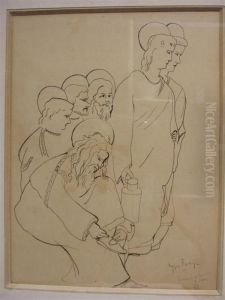Yves Farge Paintings
Yves Farge was a significant French figure whose contributions spanned beyond the traditional boundaries of art, touching upon journalism, politics, and resistance activities during World War II. Born on April 25, 1899, in Feurs, Loire, France, Farge's multifaceted career was marked by his commitment to social and political causes, which was reflected in his work and actions throughout his life. Although not an artist in the conventional sense of painters or sculptors, Farge's artistic contributions can be seen through his writings, journalistic endeavors, and the way he used his platform to advocate for freedom and resistance against oppression.
During the Second World War, Yves Farge became an emblematic figure in the French Resistance, using his skills in communication to fight against the Nazi occupation of France. His role in the Resistance was not just as a foot soldier; he was deeply involved in the intellectual and information warfare against the occupiers, contributing to underground newspapers and engaging in propaganda efforts to boost the morale of the French population and the Resistance fighters. His work during this period was crucial in disseminating the ideals of liberty and resistance, making him a key figure in the French struggle for liberation.
After the war, Farge's commitment to social issues continued to be a driving force in his career. He was appointed as the Commissioner of the Republic for the Rhône-Alpes region, where he was involved in reconstruction and rehabilitation efforts following the devastation of the war. In this role, he focused on issues such as housing, public health, and the reintegration of former Resistance fighters into civilian life, showcasing his dedication to rebuilding France both physically and socially.
Yves Farge's life was tragically cut short when he died in a car accident on March 3, 1953, in Sainte-Colombe, Rhône, France. Despite his relatively short life, his legacy lived on, particularly through honors such as the Prix Yves Farge, a journalism award established in his memory to recognize excellence in reporting on social issues. His life and work remain emblematic of the intersection between art, activism, and politics, highlighting how journalistic and intellectual efforts can contribute to social change and the fight against tyranny.
